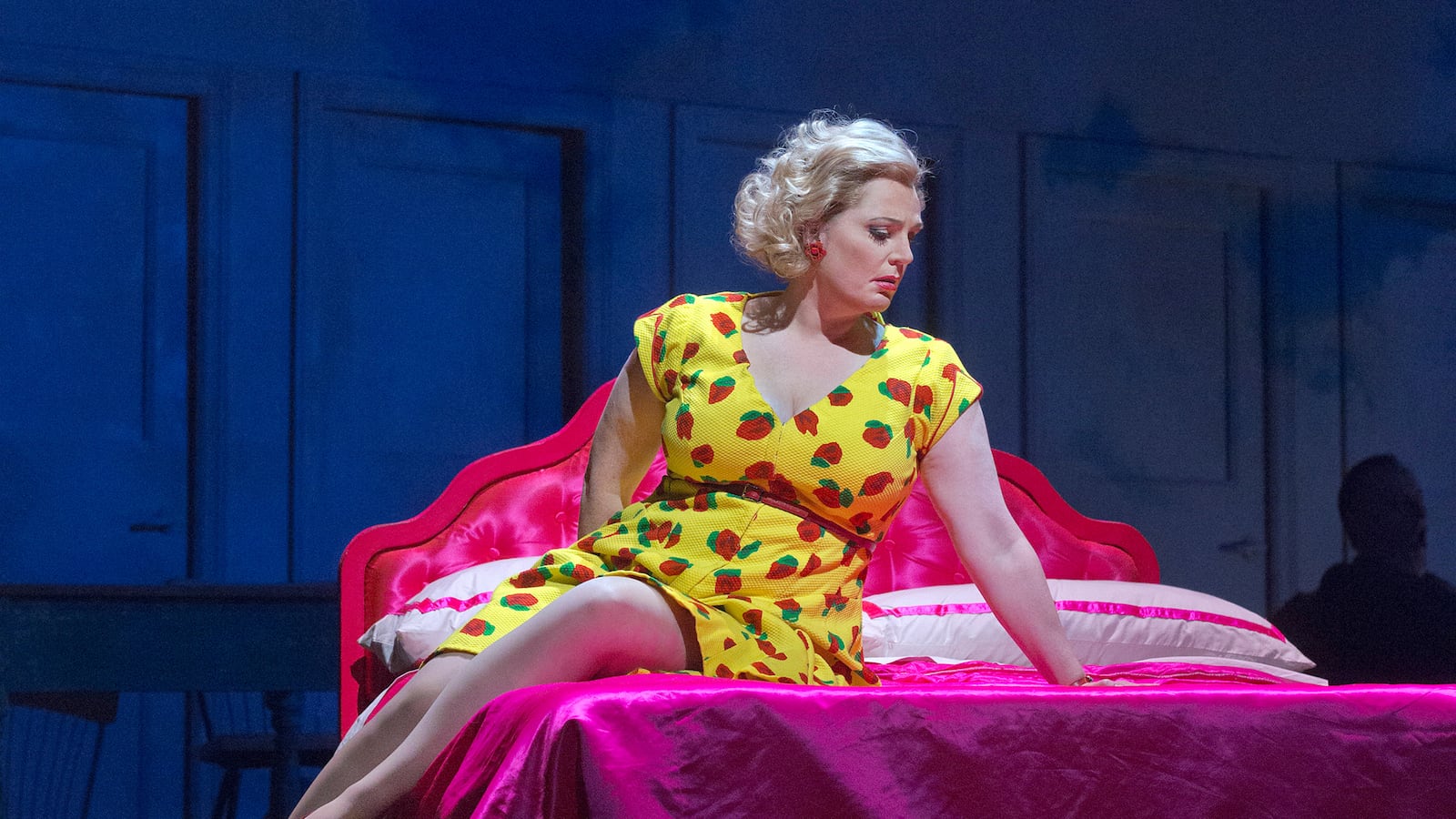Last week during Shostakovich’s Lady Macbeth of Mtsensk at the Metropolitan Opera, I was watching an old man hump a table in front of a mountain of garbage when it occurred to me: the last six months have been particularly bizarre at the Met.
And that’s saying a lot for the Metropolitan Opera. Although perceived by some as little more than a glorified funeral home reeking of elitism, mothballs and cultural irrelevance, I have always found it to be truly bizarre and wildly alive.
But the last few months have been especially strange. True the other night’s performance of Lady Macbeth of Mtsensk was one of the weirder productions I have ever seen, with large muscular men wielding pickaxes under a giant disco ball in blood-splattered wedding dresses, the lead soprano walking through an actual sprinkler center stage as a symbol of her repressed (but now bursting) sexuality, and an extended simulated sex sequence that made use of a fridge, a wall and various other set pieces while a giant rose floated above the action.
This is not to say I didn’t like it. I liked it a great deal. But the exquisite weirdness of the production kept reminding me of the general weirdness at the Met of late, capped by Thursday’s news that the Met Opera’s deficit had swelled to $22 million.
The Metropolitan Opera is the old-school Cadillac of arts institutions. That metaphor cuts both ways: big, luxurious, flashy, and glamorous, but also gas-guzzling and inefficient, with miserably poor pick up. Recently it feels, too, as if the steering may be blown and it’s veering wildly out of control.
The Met, though gigantic and unwieldy, has for years stood at the vanguard of the art form--certainly in this country, and perhaps in the world. It has always featured the very best voices and employed the most sophisticated stagecraft of any opera house.
Largely because of the hard work and dedication of Music Director James Levine, the orchestra is now considered not only one of the finest opera orchestras in the world, but has taken on added artistic significance with tours and concerts of its own, including a yearly concert series at Carnegie Hall. Since the arrival of Chorus Master Donald Palumbo, the Met chorus now commands that same level of excellence as the orchestra.
With a seating capacity of nearly 4,000, the Met effectively dwarfs London’s Royal Opera House (2,256) and La Scala in Milan (2,800). The Met is noteworthy not only for its house size, however, but for the sheer volume of its season.
With over 200 performances a year, the Met needs to sell 4,000 tickets to each of them in order to sell out. That’s 800,000 tickets. No other opera house in the world comes close to that number of performances--or the necessity of having to sell that many tickets.
While the Met reported filling 92% of its seats in 2008, that number fell to 79% in 2013. And despite broadcasting live opera performances to 2,000 movie screens across the world, the Met’s Live in HD program has reportedly flatlined at $28 million in earnings, with little room for greater growth. Meanwhile, production costs continue to rise.
The flagging attendance figures laid the groundwork for Peter Gelb, General Manager of the Met, to ask for steep cuts in the pay of the union employees that work there--most prominently the Met Opera chorus and orchestra. The unions countered that the expenditures of the Gelb administration should be reduced to match what the Met is taking in, rather than penalizing the workers for the administration’s overspending.
Matters escalated from there, with threats of a strike and a lockout making headlines throughout the summer. Adding fuel to the fire was an often ugly war of words between Mr. Gelb and the unions, both in the press and on social media.
Then there was the vandalism. In June, the executive offices of the Metropolitan Opera were broken into and graffitied with obscene messages. Neither Mr. Gelb nor the unions claimed responsibility for the spray painted vulgarities, and the case remains unsolved.
“I don’t see it being related to the labor dispute,” said Alan S. Gordon, the executive director of the American Guild of Musical Artists, the union representing the chorus in the negotiations. “Nobody’s that crazy.” Well, we hope.
Regardless, in August, the unions agreed to accept salary cuts, in exchange for which Mr. Gelb agreed to match the cuts on the administrative side and to the appointment of an independent financial adviser to monitor the Met’s future spending. Thus, a strike was averted and we have had a Met season this year--albeit a super weird one.
Watching Lady Macbeth of Mtsensk’s bizarre but highly effective sprinkler sequence--in which the lovely and talented soprano Eva-Maria Westbroek sings while moving in and out of the droplets--reminded me of my trip to the Met exactly two weeks earlier, in which several young people had tried to spit on me for being a “terrorist sympathizer”.
It was the premiere of The Death of Klinghoffer and I broke the huge line of protesters outside Lincoln Center in order to get to the theatre after several hours of listening to them chant “Shame on You!” and “Mr. Gelb burn down this set!”
As soon as I broke the line, the kids whom I had been standing next to turned rabid on me. In defiance, I held my ticket above my head, which triggered the spitting and chants of “How Dare You!” I didn’t get hit by anything, so I think they were tasteful enough to mime spit at me, but it’s the thought that counts, no?
Once I made it through the three NYPD checkpoints and got inside the Met, there were police officers stationed everywhere: one on each side of every balcony, and several more scattered throughout the audience. It was a full house despite rumors of a bomb threat.
The only disruption came half way through the first act, when a single man down in orchestra left began chanting “The murder of Klinghoffer will never be forgiven!” over and over for about 20 seconds until, I assume, he was escorted out.
This was countered by a woman two rows away from me in Dress Circle who, as the conductor appeared for his bow at the end of intermission, screamed “WE FUCKING LOVE IT!” Very rock and roll.
While the Met may indeed be rocking--generating excitement, making headlines and spurring discussion--it will continue to be a very bumpy ride. Case in point: last week, Peter Gelb sent a letter to all Met principal singers asking them to take “a 7% reduction in your contractual compensation at the Met for the remainder of this season, as well as subsequent seasons through 2017/18.”
Time will tell if Mr. Gelb’s latest move ignites another war of words. But for a musty old funeral home, there’s some serious action going down at the Metropolitan Opera, and, if the past year is any indication, there will be plenty of weirdness to come.






